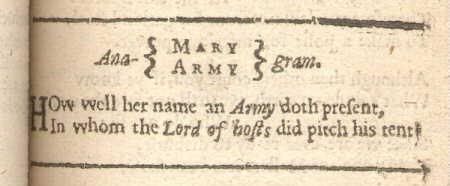Okay, I'll start over, but first I'll tell you that today's Post pertains to anagrams. You saw how I was able to flip the four letters of "post" to create five legitimate words (six, if you count the word "post").
What brought me to this type of word play was an early draft of a new short fiction. I toyed with the title of the piece as an anagram, and later incorporating it into my story. I reconsidered that when it came time to name my characters, and wondered about that effect. The jury is still out on the latter, but I find it intriguing. I'll keep you posted (also read as depots, despot).
In any event, I explored the nature and history of anagrams, and became more fascinated. Today, I'll share some of what I found with you.
 |
| The verb form is anagrammatize. A person who creates anagrams is an anagrammatist. |
orchestra becomes carthorse; parliament may become partial men. A name like Donna becomes and no or and on; Clint Eastwood becomes old west action, or how about this one, Elvis = lives. The phrase new door becomes one word, and the four points of the compass are thorn, shout, seat, and stew.
The goal of serious or skilled anagrammatists it to produce anagrams that in some way reflect or comment on the subject. Such an anagram may be a synonym or antonym of its subject, a parody, a criticism, or praise––for example, William Shakespeare = I am a weakish speller.
More by-the-bys:
-- the word "anagrams" is an anagram of "ars magna," Latin for "great art."
-- Wordsmith notes that the right to lampoon royalty and politicians, using anagrams, was enshrined in English law, when King John signed the Magna Carta (Anagram Act) in 1215.
-- Wordsmith notes that the right to lampoon royalty and politicians, using anagrams, was enshrined in English law, when King John signed the Magna Carta (Anagram Act) in 1215.
One of the writing resource books in my Library is The Wordsworth Dictionary of Anagrams, a book of 20,000 words arranged alphabetically, including proper names, compiled by Michael Card. A few anagram sites are: Everyday Vocabulary Anagrams or One Across. Check out one or the other, or all of them. In the meantime, I leave you with this piece of whimsy:
I hope you found this interesting, and that you'll consider using anagrams in your next writing piece whether it's fiction or poetry. At the least, have a go at it to find out what fun is found in creating anagrams, and let me know if you, too, decide to use anagrams in your writing.
I hope you found this interesting, and that you'll consider using anagrams in your next writing piece whether it's fiction or poetry. At the least, have a go at it to find out what fun is found in creating anagrams, and let me know if you, too, decide to use anagrams in your writing.

To stake her steak she takes the skate and teaks to Keats.
ReplyDeleteHe retreats: rare test passed in spades.
RB, but today, I'm BR.
DeleteBravo! RB, I mean BR!!!! I had to pause to flip the letters in the air, especially line 2.
I take it you are into anagrams. What good brain teasers they are.
Thanks for your comment. I was good.